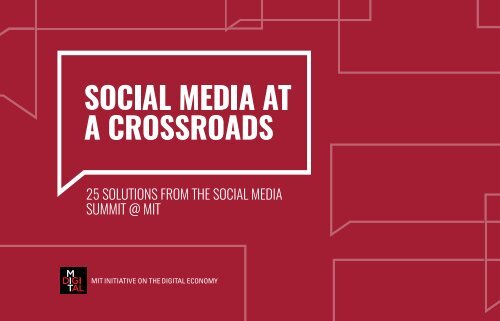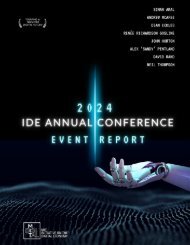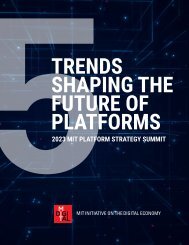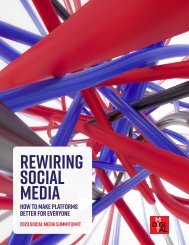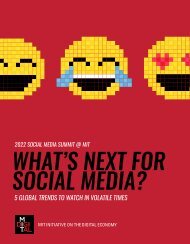Create successful ePaper yourself
Turn your PDF publications into a flip-book with our unique Google optimized e-Paper software.
25 SOLUTIONS FROM THE SOCIAL MEDIA<br />
SUMMIT @ MIT
Sinal Aral, director of the MIT Initiative on the Digital Economy and author of<br />
<strong>The</strong> Hype Machine, led the Social Media Summit @ MIT on April 22, 2021.<br />
KEY ISSUES<br />
Too much power in too few corporate hands that<br />
stymies innovation and competition.<br />
<strong>The</strong> perception—and in many cases, the reality—that<br />
corporate profits and speed to market threaten consumer<br />
privacy, election integrity, and democratic goals.<br />
A proliferation of fake news reports amplified by<br />
algorithmic tools and network effects.<br />
Insufficient platform oversight, transparency, and<br />
regulatory pressure, particularly in the U.S.<br />
SOCIAL MEDIA<br />
SOLUTIONS<br />
Pervasive digital connectivity requires<br />
new thinking.<br />
What does it mean today to rescue truth<br />
online or to humanize digital design?<br />
Why are free speech and antitrust<br />
heated issues once again?<br />
<strong>The</strong> answer is that social media has<br />
struck many nerves. Far beyond family<br />
chats, photo updates, and public<br />
relations campaigns, social media<br />
now has a sweeping impact on<br />
nearly every aspect of society. All of<br />
society—including our homes and<br />
workplaces—is digitally connected<br />
in unprecedented and potentially<br />
dangerous ways.<br />
Sinan Aral, director of the MIT Initiative<br />
on the Digital Economy (IDE) writes<br />
extensively about the massive influence<br />
of social media. In his latest book, <strong>The</strong><br />
Hype Machine, he points out that social<br />
media platforms are no longer simple<br />
conduits of engagement; they are huge<br />
economic empires.<br />
From the U.S. presidential elections<br />
and aftermath, to attitudes about<br />
coronavirus vaccines, Aral argues that<br />
it’s impossible to ignore the dramatic<br />
impact of social media. “We are truly<br />
at a crossroads where decisions are<br />
being made on how to regulate and<br />
institute policies to ameliorate the<br />
harmful effects of social media,” he<br />
said. “It’s time to fix the crisis.”<br />
While most agree on the need for<br />
reform, big obstacles remain. Who<br />
should dictate and regulate social<br />
media—governments, the tech industry,<br />
or independent committees? Who will<br />
enforce regulations that emerge?<br />
“Social media is rewiring the central<br />
nervous system of humanity in real<br />
time and we’re now at a crossroads<br />
between its promise and its peril.”<br />
SINAN ARAL<br />
On April 22, 2021, the IDE<br />
hosted the MIT Social<br />
Media Summit, which<br />
attracted more than 20,000<br />
virtual attendees. <strong>The</strong> event<br />
brought together business,<br />
policy, and academic<br />
experts to discuss social<br />
media trends and solutions<br />
that—as moderator Sinan<br />
Aral pointed out—can<br />
help “steer us toward<br />
the promise of digital<br />
technologies and away<br />
from the perils.”<br />
This report offers a sixpoint<br />
roadmap for platform<br />
reform. “We need all of<br />
these oars rowing in the<br />
same direction at once<br />
for substantive change to<br />
occur,” said Aral.<br />
CONTENTS<br />
03 RESCUING TRUTH<br />
05 ENSURING TRANSPARENCY<br />
07 FACEBOOK SEES ROOM<br />
FOR IMPROVEMENT<br />
08 REVIVING COMPETITION<br />
10 HUMANIZING DESIGN<br />
12 ENLIGHTENING BUSINESS<br />
MODELS<br />
14 RESTORING FREE SPEECH<br />
16 ONWARD
PANEL<br />
WATCH VIDEO<br />
RESCUING TRUTH<br />
Online media is aiding those who want to<br />
manipulate the truth for mass audiences.<br />
SOLUTIONS<br />
1<br />
2<br />
3<br />
4<br />
Hold platforms accountable for designs that amplify lies.<br />
Focus on and shut down prolific disinformation networks.<br />
Use content interventions to nudge people toward awareness<br />
of falsity and accuracy.<br />
Use accuracy nudges to crowdsource falsity labels so that<br />
algorithms can be trained to automatically identify lies.<br />
Social media is increasingly being used to obfuscate the truth<br />
by amplifying false ideas faster and farther than traditional<br />
media. Targeting and personalizing news feeds makes it<br />
difficult to uncover the source of false news online and for<br />
consumers to discern fact from fiction. And all too often, noted<br />
Sinan Aral, platforms and their advertisers reap the financial<br />
rewards of this online activity.<br />
THE ROLE OF JOURNALISTS<br />
Maria Ressa knows first-hand about the precarious state<br />
of press freedom. As CEO of Rappler, a Philippines-based<br />
news organization, Ressa was convicted in June 2020 of libel<br />
for publishing stories about government actions. She was<br />
sentenced to up to six years in prison, then freed on bail.<br />
Over the years, Rappler has fervently documented the plight of<br />
government disinformation in the Philippines. “<strong>The</strong> [Philippine]<br />
government has used social media to its advantage enabling<br />
insidious manipulation of facts on social platforms,” Ressa<br />
said. Ressa defines the false news campaigns—especially<br />
those on Facebook—as deliberate and calculated attempts to<br />
“infect the information ecosystem with lies that cause users<br />
to become impervious to facts.” She noted that users may<br />
not realize they’re being duped, but society has to call out<br />
disinformation for what it is.<br />
Ali Velshi, a senior economic and business correspondent<br />
for NBC News, believes that it’s the role of journalists to bear<br />
witness to news and to hold power accountable. “But if that<br />
power is working to discredit you, over time that effort grows<br />
and creates distrust of the media,” said Velshi. “It doesn’t<br />
matter what facts or evidence you have. <strong>The</strong> media has been<br />
painted with the same brush as lies.”<br />
Velshi encourages healthy debate to understand how to amplify<br />
pluralism. “Facts are not the enemy,” said Velshi. “Unreliability,<br />
dishonesty, and falsity are the enemy.”<br />
POLICING CONTENT<br />
Clint Watts of the Foreign Policy Research Institute draws<br />
on his experience with counter-terrorism and cyberwarfare<br />
to understand social media’s dynamics. <strong>The</strong> distinguished<br />
research fellow believes that some rating systems and digital<br />
verification tools, such as blockchain, could help to<br />
authenticate video and audio streams.<br />
However, Watts notes that policing content with fact<br />
checking or warning labels generally doesn’t work since false<br />
content can be created faster online than it can be policed.<br />
Additionally, telling people what not to say undermines basic<br />
democratic ideals.<br />
Watts recommends focusing on the most prolific offenders of<br />
false speech. “It usually comes down to a small network of big<br />
offenders,” he said. “We know about them and [enforcement]<br />
needs to focus there for maximum impact.”<br />
PANELISTS<br />
Camille François<br />
CHIEF INNOVATION OFFICER , GRAPHIKA INC.<br />
Ali Velshi<br />
HOST, VELSHI & BUSINESS CORRESPONDENT, NBC<br />
Maria Ressa<br />
CEO, RAPPLER<br />
READ BIOS<br />
Clint Watts<br />
DISTINGUISHED RESEARCH FELLOW,<br />
FOREIGN POLICY RESEARCH INSTITUTE<br />
Despite the complexities, Camille François, Chief Innovation<br />
Officer at Graphika, is hopeful that a combination of regulatory<br />
and public pressure will curb abuse. “We must continue to<br />
shine a light on these networks of offenders,” she said.<br />
François believes that incremental progress is being made.<br />
When issues surrounding fake news were raised five years ago,<br />
no one in Silicon Valley seemed to care. More recently, however,<br />
pressure on platform companies is being heeded to a small<br />
extent. “We live in a new reality,” François said. “It still isn’t<br />
perfect, we want more, but it proves that public pressure can<br />
work. We’re at a pivotal moment.”<br />
“Facts are not the enemy.<br />
Unreliability, dishonesty,<br />
and falsity are the enemy.”<br />
ALI VELSHI<br />
3
4
PANEL<br />
WATCH VIDEO<br />
ENSURING TRANSPARENCY<br />
Online privacy and security remain at odds.<br />
Who decides what data to protect?<br />
PANELISTS<br />
READ BIOS<br />
Carole Cadwalladr<br />
AUTHOR AND JOURNALIST<br />
THE OBSERVER<br />
Nate Persily<br />
PROFESSOR<br />
STANFORD LAW SCHOOL<br />
<strong>The</strong> world is facing what Sinan Aral calls<br />
a “transparency paradox.” On one side<br />
is the necessity for researchers and the<br />
public to know what’s going on under the<br />
hood of platforms. <strong>The</strong>y want to know<br />
where data originates, how accurate it is,<br />
and what it’s used for.<br />
At the same time, there’s a critical need<br />
to safeguard individual data privacy and<br />
security. With unprecedented amounts of<br />
data about individuals and about society,<br />
how can we balance these two needs?<br />
HOLDING THEM ACCOUNTABLE<br />
<strong>The</strong> experts on the “Ensuring<br />
Transparency” panel agreed that<br />
Facebook, in particular, must be held<br />
accountable for not freely releasing<br />
data to researchers and users.<br />
John Markoff<br />
AFFILIATE FELLOW<br />
STANFORD HAI<br />
Kate Starbird<br />
ASSOCIATE PROFESSOR<br />
UNIVERSITY OF WASHINGTON<br />
“It’s been two decades and here we<br />
are—corporations can’t self-police.<br />
We need robust legislation.”<br />
JOHN MARKOFF<br />
Carole Cadwalladr, the London-based<br />
journalist who broke the story of<br />
Cambridge Analytica profiting from<br />
sharing Facebook data, believes that<br />
the social media giant is the only one<br />
protecting its privacy today. “Journalists<br />
and the public are out-gunned in our<br />
ability to get data and answers from<br />
Facebook,” said Cadwalladr.<br />
<strong>The</strong> Cambridge Analytica scandal<br />
initially sparked calls to reform Facebook<br />
and other platforms, yet the public<br />
soon lost interest. When the Federal<br />
Trade Commission fined Facebook $5<br />
billion for anticompetitive practices,<br />
the company’s share price actually<br />
rose. Cadwalladr argues that sustained<br />
pressure and penalties must be levied<br />
on social media companies to hold them<br />
accountable for their actions.<br />
BETTER DATA ACCESS<br />
Researchers and data scientists<br />
continue to express frustration over the<br />
lack of data access to major platforms.<br />
Kate Starbird, an associate professor<br />
at the University of Washington, notes<br />
that one company is making its data<br />
more available. “We are able to review<br />
data patterns on Twitter because their<br />
data is public,” she said. “Facebook and<br />
YouTube do not readily share data and<br />
we can’t study them very well.”<br />
Starbird says that Facebook is making<br />
attempts to share data with tools such<br />
as CrowdTangle, which allows publishers<br />
to track how content spreads around<br />
the web. Yet she believes not enough is<br />
being done to lift the veil. She would like<br />
to see tools that offer more algorithmic<br />
transparency so that researchers could<br />
examine the peer-to-peer sharing of<br />
misinformation and other trends. “This<br />
would help us understand malicious<br />
use and prevent it,” she said.<br />
But opening platforms to scientific<br />
study has been problematic for many<br />
research universities, since only<br />
legislation can force platforms to<br />
share data. Nate Persily, a professor<br />
at Stanford Law School, suggests<br />
offering platforms incentives such as<br />
legal immunity so that researchers can<br />
look under the hood.<br />
John Markoff, an affiliate fellow at<br />
Stanford HAI, seconds that notion. “It’s<br />
been two decades and here we are—<br />
corporations can’t self-police,” Markoff<br />
said. “We need robust legislation.”<br />
SOLUTIONS<br />
5<br />
6<br />
7<br />
8<br />
Give researchers access to more data, using<br />
technologies such as differential privacy and<br />
institutional mechanisms, like data safe harbors.<br />
Offer platforms incentives, like legal immunity, to<br />
share more data with researchers.<br />
Create independent panels to oversee research funding<br />
by platforms.<br />
Require robust legislative remedies to anticompetitive<br />
platform practices.<br />
5
6
FIRESIDE CHAT<br />
WATCH VIDEO<br />
FACEBOOK SEES ROOM<br />
FOR IMPROVEMENT<br />
Facebook’s VP of Global Affairs says the company is<br />
working to combat hate speech and other issues.<br />
Nick Clegg<br />
VICE PRESIDENT OF GLOBAL AFFAIRS<br />
AND COMMUNICATIONS, FACEBOOK<br />
Sinan Aral<br />
DIRECTOR, MIT IDE<br />
SOLUTIONS<br />
9<br />
10<br />
11<br />
Create collaborative global institutions where<br />
discussions about governance can take place.<br />
Establish independent U.S. statutory bodies—not the<br />
FTC or FCC—to vet compliance with guidelines.<br />
Offer platforms ‘earned immunity’ from civil liability,<br />
e.g. under Section 230, if they comply with content<br />
moderation regulations.<br />
Facebook VP of Global Affairs Nick Clegg joined Sinan<br />
Aral to discuss several topics, including the need for social<br />
media regulation, changing geopolitical influences, and<br />
algorithm transparency.<br />
Clegg, who previously held the post of deputy prime<br />
minister of the U.K., said that Facebook is working to<br />
address hate speech and problematic political news<br />
on the platform. He admitted that the company can do<br />
more to make data available to researchers while<br />
protecting user privacy.<br />
He also agrees that independent oversight is needed<br />
and notes that in some cases, Facebook is already<br />
inviting external scrutiny of its practices. “We’re way<br />
beyond the stale debate of whether we need new rules<br />
of the road” said Clegg. “Of course, we need to update<br />
25-year-old regulations.”<br />
Those regulations include Section 230 of the U.S.<br />
Communications Decency Act, which provides immunity for<br />
website platforms from third-party content. Clegg believes<br />
that reform should focus on how to regulate platforms at a<br />
national level without what he calls “balkanizing the global<br />
internet.” Yet he wonders if regulation is possible without<br />
destroying what’s free about the internet.<br />
Regulatory issues are more difficult than many assume,<br />
Clegg noted, especially in a time of political “deglobalization<br />
and polarization.” For example, China has<br />
made massive advances in AI without the angst about bots,<br />
data use, and privacy. It’s a model that might be attractive<br />
to some nations as they build out their internet presence.<br />
Clegg also hopes the West will include India—a country<br />
that has a huge, nascent social media market and a strong<br />
central government—in its global thinking. “<strong>The</strong> future of<br />
internet governance will be decided in India,” he said.<br />
Clegg suggests two starting points in the effort to moderate<br />
content: establish community standards and aggressively<br />
remove illegal content.<br />
Facebook currently employs 35,000 people to moderate<br />
content and address appeals. <strong>The</strong> company also uses AI<br />
to filter and block false content. “But we can be held to<br />
even more stringent rules,” he said. “We publish our<br />
own data every 12 weeks, but that’s not the same as an<br />
independent audit.”<br />
While there’s general consensus that illegal content, such<br />
as sexual exploitation, must be removed from social media<br />
sites, Clegg says that content slips through the cracks and<br />
you end up “playing endless whack-a-mole.”<br />
<strong>The</strong> VP suggests that platforms could possibly earn<br />
immunity to legal liability if they prove they’ve taken all<br />
possible steps to squash illegal content. “This would put<br />
pressure on Silicon Valley companies to make systems as<br />
effective, resourced, and transparent as possible.”<br />
Even so, an independent statutory body—not the FTC<br />
or FCC—would have to vet whether the company’s are<br />
meeting guidelines.<br />
7
PANEL<br />
WATCH VIDEO<br />
REVIVING COMPETITION<br />
Antitrust is just one of the ways to open up social<br />
media to new players.<br />
PANELISTS<br />
Joshua Gans<br />
READ BIOS<br />
PROFESSOR<br />
UNIVERSITY OF TORONTO<br />
Marietje Schaake<br />
INTERNATIONAL POLICY<br />
DIRECTOR, STANFORD<br />
CYBER POLICY CENTER<br />
Sinan Aral opened the discussion by noting<br />
that competition is the biggest incentive<br />
that the platforms have to change. <strong>The</strong><br />
panelists agreed that there is clear market<br />
concentration in the social economy when<br />
you consider Facebook, Twitter, and Google.<br />
Business practices, including mergers and<br />
acquisitions, API access, and data access,<br />
all affect competition as well.<br />
BREAK IT UP<br />
Zephyr Teachout is a vocal advocate<br />
for breaking up Big Tech. <strong>The</strong> assistant<br />
professor of law at Fordham Law School<br />
wants to see state and federal antitrust<br />
cases pending against Facebook renewed.<br />
Teachout cited a number of reasons to<br />
reopen the cases, including the mergers of<br />
Instagram and WhatsApp, the company’s<br />
anti-competitive policies around API<br />
access, and information leaked from<br />
Facebook employees. “We’re dealing<br />
with an array of issues,” she said,<br />
“including concentration that is choking<br />
off innovation, harming advertisers and<br />
small businesses, and leading to less<br />
competition for quality and privacy.”<br />
Teachout also noted that the infrastructure<br />
of tech firms is being driven or funded by<br />
a business model that amplifies highconflict<br />
content. She sees the need to<br />
curb the industry’s excessive political<br />
and lobbying power. “Just a handful of<br />
people really control the communications<br />
infrastructure in our country,” she said.<br />
Tapping into traditional tools, such as<br />
horizontal breakups (Facebook and<br />
Instagram) and vertical breakups (Google<br />
and Google Maps), might help keep<br />
companies in line, Teachout added.<br />
INTEROPERABILITY AND DATA<br />
PORTABILITY<br />
Joshua Gans, a professor of economics at<br />
the University of Toronto, offers alternative<br />
approaches to keeping Big Tech in check:<br />
Network interoperability and data portability.<br />
Gans believes that interoperability—that is,<br />
when different networks are able to accept<br />
services from other systems—can effectively<br />
address market domination. For example, it<br />
would allow users to leave Facebook for a<br />
better product without losing their current<br />
network connections.<br />
While this scenario is technically feasible,<br />
it would require extending the internal<br />
protocols for interpersonal communication.<br />
“If we have the will to establish technical<br />
regulations that will open up networks, it<br />
can be achieved,” said Gans. Implementing<br />
a three-pronged attack of interoperability,<br />
recognizing the consumer’s voice and needs,<br />
and reconsidering advertising dynamics, can<br />
yield results without forcing firms to break<br />
apart, he said.<br />
THE EU ROADMAP<br />
Marietje Schaake offered a roadmap to<br />
promote healthier competition based on<br />
proposals in the European Union. Schaake is<br />
the international policy director at Stanford<br />
University’s Cyber Policy Center and served<br />
as a member of the European Parliament<br />
for a decade. She explained that the Digital<br />
Markets Act (DMA) is one of several<br />
legislative proposals by the European<br />
Commission designed to promote fairness<br />
in the digital economy and dictate corporate<br />
responsibilities for noncompliance.<br />
“<strong>The</strong> DMA tries to address two problems:<br />
high barriers to entry and anti-competitive<br />
practices,” said Schaake. <strong>The</strong> act, which<br />
could be implemented as early as 2023,<br />
proposes ex ante rules that would<br />
preemptively constrain operators before bad<br />
behavior occurs. For instance, penalties of<br />
up to 10 percent of annual revenue could be<br />
imposed on companies for noncompliance,<br />
while repeat offenders could face breakup.<br />
Other sanctions, such as removing<br />
violators from approved government<br />
contractor lists or imposing personal<br />
liability for board members, should also<br />
be considered, said Schaake.<br />
In April 2021, the European Commission<br />
fined Facebook €110 million for<br />
misinformation surrounding its 2014<br />
takeover of WhatsApp. Schaake noted that<br />
all too often fines like these are seen by big<br />
corporations as the cost of doing business.<br />
FUELING MARKET INNOVATION<br />
As a venture capitalist, Albert Wenger puts a<br />
premium on market innovation. Social media<br />
interoperability and programmability are two<br />
means to that end.<br />
To Wenger, a managing partner at Union<br />
Square Ventures, programmability means<br />
that any third party can create a service<br />
that works with another. “We would like<br />
others to innovate on top of Facebook’s<br />
huge social reach and create innovative<br />
services without having to ask Facebook<br />
for permission,” he said.<br />
Wenger believes that programmability<br />
will be “the most powerful thing we can do<br />
to shift power from the existing networks”<br />
for both end users and the marketplace.<br />
It can also allow the marketplace—not the<br />
government—to intervene.<br />
SOLUTIONS<br />
12<br />
13<br />
14<br />
15<br />
Zephyr Teachout<br />
ASSISTANT PROFESSOR<br />
FORDHAM LAW SCHOOL<br />
Albert Wenger<br />
MANAGING PARTNER<br />
UNION SQUARE PARTNERS<br />
“Just a handful of people really<br />
control the communications<br />
infrastructure in our country.”<br />
ZEPHYR TEACHOUT<br />
Break up big companies, starting with Facebook.<br />
Legislate interoperability as well as social network<br />
and data portability.<br />
Emulate EU proposals for stricter anti-competitive<br />
penalties to deter corporate misbehavior.<br />
Create programmability with the major platforms to<br />
encourage innovation.<br />
8
9
PANEL<br />
WATCH VIDEO<br />
HUMANIZING DESIGN<br />
Fixing AI and social media design flaws begins with<br />
recognizing underlying problems.<br />
PANELISTS<br />
Safiya Noble<br />
READ BIOS<br />
ASSOCIATE PROFESSOR/CO-<br />
FOUNDER, CENTER FOR CRITICAL<br />
INTERNET INQUIRY AT UCLA<br />
Renée Richardson<br />
Gosline<br />
PRINCIPAL RESEARCH<br />
SCIENTIST, MIT SLOAN<br />
<strong>The</strong> way humans design AI-based platforms and<br />
the algorithms that fuel them is driving social<br />
media’s impact on society. “We need to consider<br />
that these algorithms relate to myriad crises<br />
and outcomes in our society, including bias,<br />
racism, polarization, amplification of hatred, and<br />
violence,” Sinan Aral said. “<strong>The</strong>y are not the only<br />
cause, but we’re seeing effects on intermediate<br />
outcomes as a result of their design.”<br />
Safiya Noble, co-founder of the Center for Critical<br />
Internet Inquiry at UCLA, emphasized that<br />
social media and search engines are large-scale<br />
advertising platforms that have become a proxy<br />
for how we organize and access information and<br />
knowledge. She noted that the companies that<br />
run them are interested in a “profit imperative<br />
that has nothing to do with democracy, civil<br />
rights, human rights, and broader issues of<br />
justice and fairness in our societies.” <strong>The</strong><br />
problem with prioritizing return on investment<br />
at all costs is that the people who are most<br />
vulnerable are exploited for a tremendous profit,<br />
she added.<br />
Noble, who authored the book, Algorithms of<br />
Oppression, said it’s not enough to diversify<br />
software engineering teams by race and gender.<br />
“We also need to diversify the entire engineering<br />
core to include people who understand society,<br />
including social scientists, cognitive scientists,<br />
and people trained in different types of histories<br />
and different perspectives.”<br />
EMBRACE FRICTION<br />
Renée Richardson Gosline, a principal research<br />
scientist at MIT, sees promise in the use of<br />
behavioral psychology and the human-algorithm<br />
relationship to redesign the algorithms at the<br />
core of social media technology. “Humancentered<br />
design sounds really nice,” she said,<br />
“but in practice, we have more work to do.”<br />
One huge obstacle, Gosline noted, is reducing<br />
the appetite for systems that are frictionless.<br />
“When everything is so easy and so fast, users<br />
can re-blog, retweet, and make statements that<br />
support many of the negative outputs of social<br />
media without enough thought. Designers build<br />
systems that harness this automatic thinking<br />
way too much.”<br />
Gosline recommends slowing online interactions<br />
to give users the chance to think before sharing<br />
false news or trusting unknown sources. She<br />
suggests rethinking our orientation toward<br />
human cognition and frictionless experiences.<br />
Instead, we should embrace friction wherever<br />
and whenever possible.<br />
PROMOTING THE POSITIVE<br />
As former director at MoveOn, Eli Pariser<br />
helped pioneer the concept of online<br />
citizen engagement. In his role as CEO of<br />
Upworthy, Pariser wants to use social media<br />
and viral content to promote positive<br />
democratic purposes.<br />
His current focus is on viewing social media in<br />
terms of spaces where new digital communities<br />
can flourish. “When we look at space as a<br />
metaphor, especially urban public spaces, we<br />
start to see a lot of the same challenges online<br />
and offline,” said Pariser. <strong>The</strong>se challenges, he<br />
noted, can include issues around inclusion and<br />
exclusion, policing, and how strangers relate to<br />
each other. “<strong>The</strong> conversation can’t be about<br />
how we make Facebook or Google or Twitter the<br />
right shape to do these public functions.’<br />
Pariser added that it’s not the job of Facebook<br />
or Google to serve everyone equally. Instead,<br />
he emphasizes the need to create new online<br />
institutions to create what he calls “healthy<br />
pluralistic, equitable, digital experiences.”<br />
PRODUCT SAFETY NEEDED<br />
As an early investor and member of Facebook’s<br />
leadership team, Roger McNamee has seen “a<br />
very different reality emerge” since he was there.<br />
A founding partner at Elevation Partners,<br />
McNamee acknowledges that societal needs<br />
have become lost in the race to succeed. “When<br />
it comes to platforms that operate at a national<br />
or global scale, policy must precede design.”<br />
McNamee supports platform regulation and<br />
accountability, as well as product safety that<br />
holds engineers, executives, and corporations<br />
responsible for any harm they may cause. He<br />
also proposes a certification process for social<br />
media designers.<br />
Facebook’s own data shows that 64 percent of<br />
people who join extremist Facebook groups do<br />
so because of the platform’s recommendations.<br />
“You cannot allow companies whose business<br />
interests conflict with public health and<br />
democracy to control the environment in which<br />
the country deliberates things like public health<br />
and democracy,” McNamee said. He added<br />
that the insurrection of the Capitol building on<br />
January 6, 2021, was predominantly organized<br />
on Facebook. “Tweaking algorithms isn’t going<br />
to fix this,” he added.<br />
<strong>The</strong> social media status quo isn’t inevitable,<br />
McNamee said. “<strong>The</strong>re are so many valid<br />
and productive uses of social media, AI,<br />
and other technologies that are being buried<br />
because surveillance capitalism creates<br />
attractive economics.”<br />
Pariser agrees that algorithms allow bad<br />
behavior to be normalized. “<strong>The</strong>re are plenty of<br />
opportunities to create new ways of mediating<br />
conversation, but it’s really hard to do that if<br />
you’re also chasing hockey-stick growth.”<br />
SOLUTIONS<br />
16<br />
17<br />
18<br />
19<br />
Eli Pariser<br />
CO-FOUNDER<br />
UPWORTHY<br />
Roger McNamee<br />
FOUNDING PARTNER<br />
ELEVATION PARTNERS<br />
“Human-centered design<br />
sounds really nice, but in<br />
practice, we have more<br />
work to do.”<br />
RENÉE RICHARDSON GOSLINE<br />
Diversify the engineering core to include<br />
social scientists, cognitive scientists, and<br />
people trained in different types of histories.<br />
Create ethics certification programs and<br />
degrees for AI designers.<br />
Embrace friction to reduce the automatic<br />
nature of information diffusion and<br />
interactions with AI.<br />
Regulate platforms for product safety; hold<br />
designers and companies accountable for the<br />
products they design and deploy.<br />
10
11
PANEL<br />
WATCH VIDEO<br />
ENLIGHTENING BUSINESS MODELS<br />
Proposals to change social media business models include<br />
subscriptions, new ad offerings, and harsher penalties.<br />
PANELISTS<br />
Rana El Kaliouby<br />
CEO<br />
AFFECTIVA<br />
READ BIOS<br />
Scott Galloway<br />
PROFESSOR<br />
NYU STERN SCHOOL<br />
Social media business models are<br />
increasingly becoming a root cause of<br />
many crises, says Sinan Aral. He believes<br />
that the attention economy—defined by<br />
social platforms that sell our attention as ad<br />
inventory to brands, governments, and NGOs—<br />
is “unbelievably effective” but asks<br />
if it’s doing good and if not, what would<br />
replace this model?<br />
THE ATTENTION ECONOMY<br />
Scott Galloway, an adjunct professor of<br />
marketing at the New York University Stern<br />
School of Business, says the attention<br />
economy has to change. He has long argued<br />
for a subscription-based social media<br />
business model that isn’t tied to advertising—<br />
one that would allow businesses to own the<br />
relationship with the end consumer in a more<br />
consumer-centric way.<br />
Galloway cites Neeva, a startup subscription<br />
search engine that “isn’t incentivized to<br />
take you to another place it can further<br />
monetize or enrage you, but to take you<br />
to the best content possible.” He believes<br />
a healthier search ecosystem will emerge<br />
when alternatives like Neeva are more<br />
widely available.<br />
He also acknowledges that a segment of<br />
society doesn’t want—or can’t afford—social<br />
media subscriptions. “<strong>The</strong>re is a danger<br />
that if the best, most fact-checked, edited,<br />
credible, and high-veracity news is behind a<br />
paywall, it may create even a more dangerous<br />
bifurcation of economic inequality.”<br />
Guy Kawasaki, chief evangelist at Canva<br />
and host of the Remarkable People podcast,<br />
says that subscription models are attractive<br />
by design but notes that “if they truly filtered<br />
out ads, many people would pay for that.”<br />
While it’s easy to point out the shortfalls<br />
of social media, Kawasaki says that small<br />
businesses all over the world rely on it for<br />
customer targeting. “If you’re a real estate<br />
firm in Santa Cruz, California, and you want<br />
to advertise a new listing to people who live<br />
in Santa Cruz, are older than 25, and have a<br />
particular background, how will it do that if<br />
you destroy Facebook? <strong>The</strong>re’s a reason<br />
why people pay Facebook for advertising:<br />
because it works.”<br />
But will Facebook ever adopt a subscription<br />
model? Galloway doesn’t think so, since<br />
there’s no financial incentive. He agreed<br />
with his fellow panelists that fines imposed<br />
to date have been far too low to discourage<br />
self-regulation.<br />
TESTING NEW MODELS<br />
Other models are being tested, such<br />
as premium and “freemium” models<br />
that feature some ad-free content with the<br />
option to pay more for superior service.<br />
<strong>The</strong>re’s also the fan model, which charges<br />
users to subscribe to the feeds of other<br />
users, and social media platforms take a<br />
percentage of the subscriptions.<br />
Data scientist and entrepreneur Hilary<br />
Mason likes these ideas, but notes just<br />
because you’re paying to follow a creator<br />
doesn’t mean the creator is not amplifying<br />
or disseminating problematic content.<br />
Mason, who is the founder of technology<br />
startup Fast Forward Labs, believes that<br />
social media ventures should step away<br />
from monolithic social platforms like<br />
Facebook. “<strong>The</strong>y should try to break down<br />
the products we’d like to see, and where to<br />
actually find value,” she said.<br />
Many companies are attempting to create<br />
positive technology business models that<br />
connect us rather than tear us apart. Affectiva,<br />
a company that specializes in facial and<br />
emotion recognition, is one such firm.<br />
CEO Rana El Kaliouby believes that Affectiva’s<br />
technology can promote beneficial outcomes,<br />
such as detecting driver distraction, fatigue,<br />
and lack of attention. “We’ve been routinely<br />
approached by intelligence agencies<br />
and governments that want to apply our<br />
technology for surveillance, security, or lie<br />
detection,” she said. “We have turned down<br />
hundreds of millions of dollars where we just<br />
felt that this is not in line with our core values.”<br />
El Kaliouby notes that Affectiva carefully<br />
considers bias and privacy infringements, too.<br />
THE PERP WALK<br />
NYU’s Galloway wants to elevate corporate<br />
ethics to the point where platform executives<br />
who don’t behave in the public interest are<br />
charged criminally. He calls for a so-called<br />
“perp walk” of corporate offenders who<br />
knowingly lied to Congress and who knew<br />
that their platforms would likely be<br />
weaponized to pervert democracy.<br />
Galloway believes that the antitrust tide may<br />
be shifting with the Biden administration and<br />
a growing anti-tech public sentiment. “I’m<br />
more hopeful that we’re going to see actual,<br />
tangible antitrust legislation,” he said.<br />
El Kaliouby hopes that consumers will vote<br />
to use one platform over another based on<br />
ethical standards. She also believes that<br />
investors should hold businesses accountable<br />
on the ethical development and deployment<br />
of technology, as well as on matters of<br />
diversity and inclusion.<br />
SOLUTIONS<br />
20<br />
21<br />
22<br />
23<br />
Guy Kawasaki<br />
CHIEF EVANGELIST, CANVA &<br />
HOST, REMARKABLE PEOPLE<br />
PODCAST<br />
Hilary Mason<br />
Develop new business models including<br />
subscription and freemium models.<br />
Tie consequences of legal violations<br />
directly to corporate executives, not<br />
just their companies.<br />
Ensure that users consent to data use;<br />
protect data privacy.<br />
CO-FOUNDER, HIDDEN DOOR<br />
& FOUNDER, FAST FORWARD<br />
LABS<br />
“<strong>The</strong>re’s a reason why people<br />
pay Facebook for advertising:<br />
because it works.”<br />
GUY KAWASAKI<br />
Strengthen regulations by adding taxes,<br />
such as programmatic media taxes, to deter<br />
algorithmic amplification.<br />
12
13
PANEL<br />
WATCH VIDEO<br />
RESTORING SPEECH<br />
<strong>The</strong> First Amendment meets the digital era—<br />
and so the battles begin.<br />
PANELISTS<br />
READ BIOS<br />
Renée Diresta<br />
RESEARCH MANAGER<br />
STANFORD INTERNET OBSERVATORY<br />
Jeff Kosseff<br />
ASSISTANT PROFESSOR<br />
US NAVAL ACADEMY<br />
<strong>The</strong> First Amendment is a cornerstone<br />
of U.S. democracy, yet Sinan Aral believes<br />
there is a need to draw lines between<br />
free and harmful speech in the age of<br />
social media.<br />
At the center of the debate is Section<br />
230 of the Communications Decency<br />
Act, which provides immunity for website<br />
platforms from third-party content. Section<br />
230, which has roots well before the<br />
advent of the internet, also must police<br />
companies and individuals that distribute<br />
speech others have created, such as<br />
bookstores or newsstands.<br />
Jeff Kosseff, an assistant professor at<br />
the U.S. Naval Academy, has written<br />
extensively about the legislation. He<br />
notes that when online services such as<br />
Prodigy and CompuServe emerged in the<br />
early 1990s with new business models,<br />
Congress and the courts took notice and<br />
overhauled telecommunications laws.<br />
In 1996, Congress passed Section 230,<br />
which treats interactive computer services<br />
differently than publishers and exempted<br />
them from liability—or at least that’s how<br />
the courts interpreted it. “Section 230<br />
has created very broad protections,” says<br />
Kosseff— protections that generally favor<br />
giant platforms.<br />
NO ABSOLUTE RIGHTS<br />
Richard Stengel, former managing<br />
editor of TIME, isn’t certain that America<br />
needs a hate speech law as much as it<br />
needs a hate speech debate. “<strong>The</strong> First<br />
Amendment is not an absolute right to free<br />
speech,” said Stengel, who served as an<br />
under secretary of state for Public Affairs<br />
and Diplomacy. “<strong>The</strong>re are many examples<br />
of speech that is not protected, such as<br />
false advertising, violations of copyright,<br />
and child pornography.”<br />
At the same time, Stengel says that<br />
Section 230 needs to be reformed to make<br />
platforms more liable for the content that<br />
they publish. “Regulation has to incentivize<br />
platforms to take responsibility for illegal<br />
content just as TIME magazine was,” he<br />
said. ”I would argue that they actually<br />
want to be regulated because they don’t<br />
like being in that gray area of subjective<br />
decisions. <strong>The</strong>y want to be able to say,<br />
‘<strong>The</strong> government made me do this.’“<br />
Yaël Eisenstat, a Future of Democracy<br />
Fellow at the Berggruen Institute and<br />
researcher-in-residence at Betalab,<br />
noted that society must understand the<br />
difference between speech and the way<br />
a social media company handles that<br />
speech. Eisentstat, who also served as a<br />
CIA officer and global head of elections<br />
integrity operations at Facebook, believes<br />
that while content moderation is important,<br />
there are other things to consider. “<strong>The</strong><br />
bigger issue is really about the tools that<br />
the platform companies are using, as well<br />
as the intentional business decisions that<br />
platforms make on what to enforce, and<br />
when to enforce their policies,” she said.<br />
Accountability is also a pressing issue.<br />
Recommendation engines often lead<br />
users down a political path, yet users<br />
are often blamed for their actions without<br />
considering that they are vulnerable to<br />
online manipulation. “No accountability<br />
exists right now for this industry,”<br />
Eisenstat noted. “But if they are not<br />
acting as legal and good stewards of<br />
democracy, there should be mechanisms<br />
to hold them accountable.”<br />
Eisenstat says if we want to promote<br />
a healthy democracy, we should argue<br />
and debate, but we shouldn’t be served<br />
totally different versions of paid political<br />
speech. “Courts are over-interpreting<br />
Section 230 to give Facebook a free<br />
pass,” she added.<br />
SPEECH AND REACH<br />
Should free speech be limited in its reach,<br />
especially if the content is potentially<br />
misleading or harmful?<br />
Renée Diresta, research manager at the<br />
Stanford Internet Observatory, first wrote<br />
about the distinction between “speech<br />
and reach” in 2018 when social media<br />
had reduced barriers—first for creation<br />
of content and then for dissemination<br />
of content. As content proliferated,<br />
recommendation engines and other<br />
algorithmic curators began to filter<br />
content in ways that incentivized users<br />
to engage or remain on the platform.<br />
Now, deliberate user engagement and<br />
inadvertent algorithmic amplification pose<br />
new dilemmas.<br />
“<strong>The</strong>re’s always been this division between<br />
your right to speak and your right to have<br />
a megaphone that reaches hundreds of<br />
millions of people,” said Diresta. “<strong>The</strong>re’s<br />
value to being able to express your antivaccine<br />
views, but the platform doesn’t<br />
necessarily need to boost it.”<br />
Diresta suggests designing interventions<br />
in the UX, such as graying the share button<br />
until a user views all content or clicks on<br />
a URL. She also recommends that fact<br />
checkers perform their work earlier in<br />
order to assess misleading or malicious<br />
content before it goes viral.<br />
SOLUTIONS<br />
24<br />
25<br />
Yaël Eisenstat<br />
FUTURE OF DEMOCRACY FELLOW,<br />
THE BERGGRUEN INSTITUTE<br />
RESEARCHER-IN-RESIDENCE, BETALAB<br />
Richard Stengel<br />
FORMER UNDERSECRETARY OF STATE FOR<br />
PUBLIC AFFAIRS & DIPLOMACY & FORMER<br />
MANAGING EDITOR OF TIME MAGAZINE<br />
“<strong>The</strong>re’s always been this<br />
division between your right to<br />
speak and your right to have<br />
a megaphone that reaches<br />
hundreds of millions of people.”<br />
RENÉE DIRESTA<br />
Distinguish between speech and reach--the right to<br />
speech and the right to amplification of that speech.<br />
Limit corporate lobbying; enforce stricter campaign<br />
finance rules.<br />
14
15
RECAP<br />
CHANNEL PARTNERS<br />
25 SOLUTIONS FROM THE SOCIAL MEDIA SUMMIT @ MIT THANK YOU<br />
ONWARD<br />
Following a full day of discussion and debate,<br />
Sinan Aral offered three calls to action.<br />
Write to Congress and demand more<br />
action.<br />
Call for a national commission on<br />
democracy and technology.<br />
Spark and convene conversations<br />
about social media reform wherever<br />
you can.<br />
“Together, we can make<br />
inroads toward solving<br />
today’s problems and<br />
heading off new ones.”<br />
SINAN ARAL<br />
1<br />
2<br />
3<br />
4<br />
5<br />
6<br />
7<br />
8<br />
9<br />
10<br />
11<br />
12<br />
13<br />
Hold platforms accountable for<br />
designs that amplify lies.<br />
Focus on and shut down prolific<br />
disinformation networks.<br />
Use content interventions to<br />
nudge people toward awareness of<br />
falsity and accuracy.<br />
Use accuracy nudges to<br />
crowdsource falsity labels so<br />
that algorithms can be trained to<br />
automatically identify lies.<br />
Give researchers access to<br />
more data using technologies<br />
like differential privacy, and<br />
institutional mechanisms like<br />
data safe harbors.<br />
Offer platforms incentives, like<br />
legal immunity, to share more<br />
data with researchers.<br />
Create independent panels to<br />
oversee research funding by<br />
platforms.<br />
Require robust legislative<br />
remedies to anticompetitive<br />
platform practices.<br />
Create collaborative global<br />
institutions where discussions<br />
about governance can take place.<br />
Establish independent U.S.<br />
statutory bodies—not the FTC<br />
or FCC—to vet compliance with<br />
guidelines.<br />
Offer platforms ‘earned immunity’<br />
from civil liability, e.g. under<br />
Section 230, if they comply with<br />
content moderation regulations.<br />
Break up big companies starting<br />
with Facebook.<br />
Legislate interoperability as<br />
well as social network and data<br />
portability.<br />
14<br />
15<br />
16<br />
17<br />
18<br />
19<br />
20<br />
21<br />
22<br />
23<br />
24<br />
25<br />
Emulate EU proposals for stricter<br />
anti-competitive penalties to<br />
deter corporate misbehavior.<br />
Create programmability with the<br />
major platforms to encourage<br />
innovation.<br />
Diversify the engineering core<br />
to include social scientists,<br />
cognitive scientists, and people<br />
trained in different types of<br />
histories.<br />
Create ethics certification<br />
programs and degrees for AI<br />
designers.<br />
Embrace friction to reduce<br />
the automatic nature of<br />
information diffusion and<br />
interactions with AI.<br />
Regulate platforms for product<br />
safety; hold designers and<br />
companies accountable for the<br />
products they design and deploy.<br />
Develop new business models<br />
including subscription and<br />
freemium models.<br />
Tie consequences of legal<br />
violations directly to corporate<br />
executives, not just their<br />
companies.<br />
Strengthen regulations by adding<br />
taxes, such as programmatic media<br />
taxes, to deter algorithmic<br />
amplification.<br />
Ensure that users consent to data<br />
use; protect data privacy.<br />
Distinguish between speech and<br />
reach--the right to speech and<br />
the right to amplification of that<br />
speech.<br />
Limit corporate lobbying; enforce<br />
stricter campaign finance rules.<br />
Thank you to our <strong>SMS@MIT</strong> channel<br />
partners. <strong>The</strong> MIT Social Media<br />
Summit was in collaboration with<br />
the MIT Office of External Relations.<br />
CONTENT PAULA KLEIN<br />
SESSION ILLUSTRATIONS DPICT<br />
16
25 SOLUTIONS FROM THE SOCIAL MEDIA<br />
SUMMIT @ MIT


